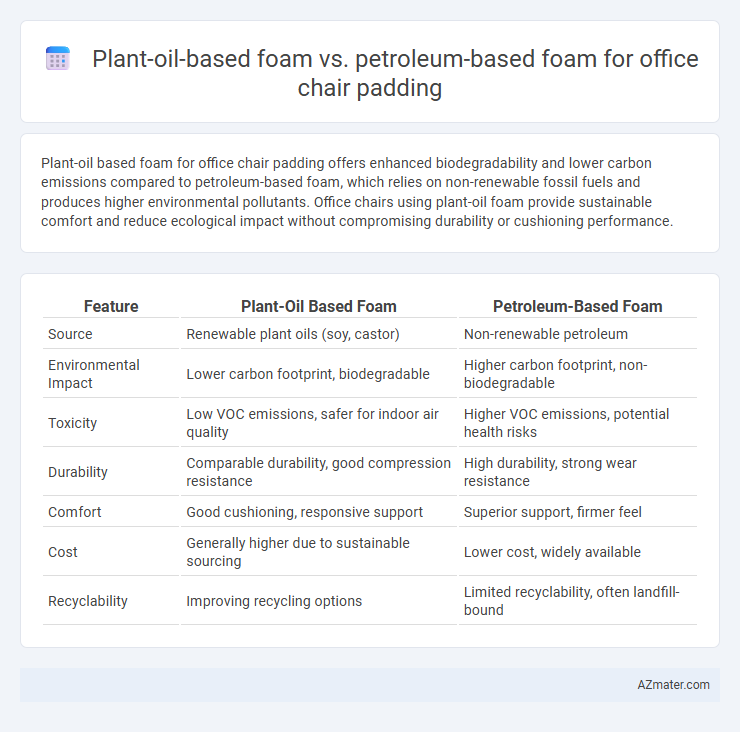Plant-oil based foam for office chair padding offers enhanced biodegradability and lower carbon emissions compared to petroleum-based foam, which relies on non-renewable fossil fuels and produces higher environmental pollutants. Office chairs using plant-oil foam provide sustainable comfort and reduce ecological impact without compromising durability or cushioning performance.
Table of Comparison
| Feature | Plant-Oil Based Foam | Petroleum-Based Foam |
|---|---|---|
| Source | Renewable plant oils (soy, castor) | Non-renewable petroleum |
| Environmental Impact | Lower carbon footprint, biodegradable | Higher carbon footprint, non-biodegradable |
| Toxicity | Low VOC emissions, safer for indoor air quality | Higher VOC emissions, potential health risks |
| Durability | Comparable durability, good compression resistance | High durability, strong wear resistance |
| Comfort | Good cushioning, responsive support | Superior support, firmer feel |
| Cost | Generally higher due to sustainable sourcing | Lower cost, widely available |
| Recyclability | Improving recycling options | Limited recyclability, often landfill-bound |
Introduction to Office Chair Padding Materials
Office chair padding commonly uses plant-oil based foam and petroleum-based foam, with each material offering distinct environmental and performance characteristics. Plant-oil based foam, derived from renewable resources like soy or castor oil, provides enhanced sustainability and reduced carbon footprint compared to traditional petroleum-based foam, which is synthesized from non-renewable fossil fuels. While petroleum-based foam typically offers high durability and consistent cushioning, plant-oil based foam increasingly matches these qualities with improved biodegradability and lower emission of volatile organic compounds (VOCs).
What is Plant-Oil Based Foam?
Plant-oil based foam is a sustainable alternative to traditional petroleum-based foam, derived from renewable resources such as soybean, castor, or palm oil. It offers comparable comfort and durability for office chair padding while reducing reliance on fossil fuels and lowering carbon emissions during production. This eco-friendly foam also provides enhanced biodegradability and decreases environmental impact throughout the product lifecycle.
Overview of Petroleum-Based Foam
Petroleum-based foam, commonly used in office chair padding, is derived from non-renewable fossil fuels and offers superior durability, resilience, and cost-effectiveness compared to alternative materials. This foam provides excellent support and cushioning by maintaining its shape under prolonged pressure, making it a popular choice in ergonomic office furniture. However, concerns about environmental impact and chemical off-gassing have prompted increasing interest in sustainable alternatives such as plant-oil based foams.
Environmental Impact Comparison
Plant-oil based foam for office chair padding significantly reduces carbon emissions compared to petroleum-based foam, as it derives from renewable resources like soy or castor oil. This bio-based foam is biodegradable and generates fewer volatile organic compounds (VOCs) during production and use, leading to improved indoor air quality and lower environmental toxicity. Conversely, petroleum-based foam relies on finite fossil fuels, contributing to higher greenhouse gas emissions and persistent environmental pollution throughout its lifecycle.
Health and Safety Considerations
Plant-oil based foam used in office chair padding offers lower VOC emissions and reduced exposure to harmful chemicals like isocyanates compared to petroleum-based foam, enhancing indoor air quality and minimizing respiratory risks. This foam type is often hypoallergenic and less likely to release toxic fumes during use or disposal, contributing to a safer workplace environment. Conversely, petroleum-based foam may contain flame retardants and other additives that pose long-term health concerns through skin contact and off-gassing.
Comfort and Ergonomics
Plant-oil based foam in office chair padding offers enhanced breathability and responsive cushioning, promoting better airflow and reducing heat buildup for improved comfort during extended use. Its natural flexibility conforms more effectively to body contours, supporting ergonomic posture and alleviating pressure points compared to conventional petroleum-based foam. Petroleum-based foam often provides durability but lacks the adaptive comfort and moisture-wicking properties essential for prolonged ergonomic support.
Durability and Longevity
Plant-oil based foam for office chair padding offers enhanced durability by resisting wear and deformation over extended periods, maintaining structural integrity under constant use. Compared to petroleum-based foam, which tends to break down faster due to oxidation and compression stress, plant-oil foam exhibits superior longevity with sustained comfort and support. The biochemical composition of plant-derived polyols contributes to a more resilient cellular structure, reducing the frequency of replacement in commercial office environments.
Cost and Market Availability
Plant-oil based foam for office chair padding generally incurs higher production costs compared to petroleum-based foam, resulting in a premium price point for end consumers. However, the market availability of plant-oil foam is expanding due to growing demand for sustainable and eco-friendly materials in office furniture manufacturing. Petroleum-based foam remains widely available and cost-effective, maintaining dominance in large-scale production and budget-sensitive commercial office chair segments.
Industry Trends and Innovations
Plant-oil based foam for office chair padding is gaining traction due to increasing demand for sustainable materials and reduced carbon footprints in the furniture industry. Innovations in bio-polyols derived from soybean or castor oils enhance the foam's durability and comfort, rivaling traditional petroleum-based foams. Industry trends emphasize eco-friendly certifications and circular economy practices, driving manufacturers to adopt plant-oil alternatives that minimize reliance on fossil fuels while maintaining performance standards.
Future Outlook for Sustainable Office Seating
Plant-oil based foam offers a renewable, biodegradable alternative to traditional petroleum-based foam, significantly reducing the carbon footprint of office chair production. Innovations in bio-based foam technology improve durability and comfort, aligning with corporate sustainability goals and eco-friendly office trends. Industry adoption is expected to accelerate as demand for sustainable seating solutions grows, driven by regulatory pressures and consumer preference for environmentally responsible materials.

Infographic: Plant-oil based foam vs Petroleum-based foam for Office chair padding
 azmater.com
azmater.com